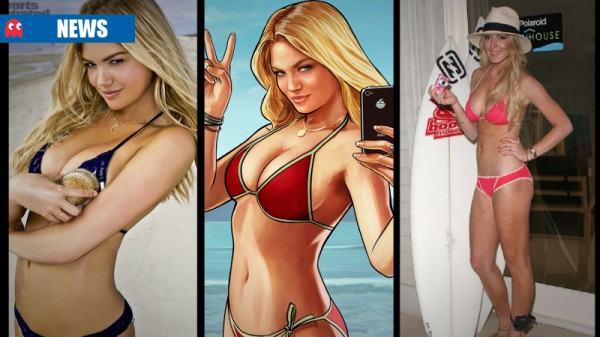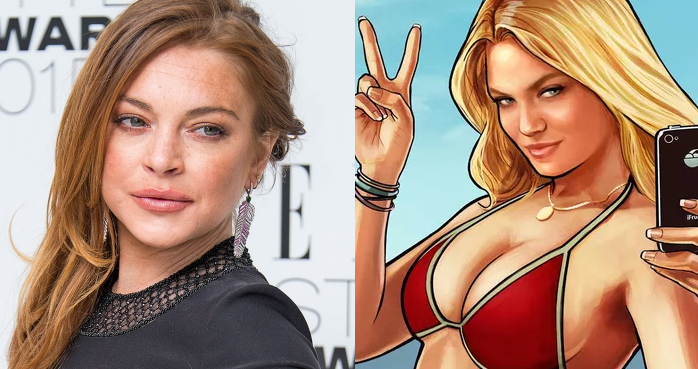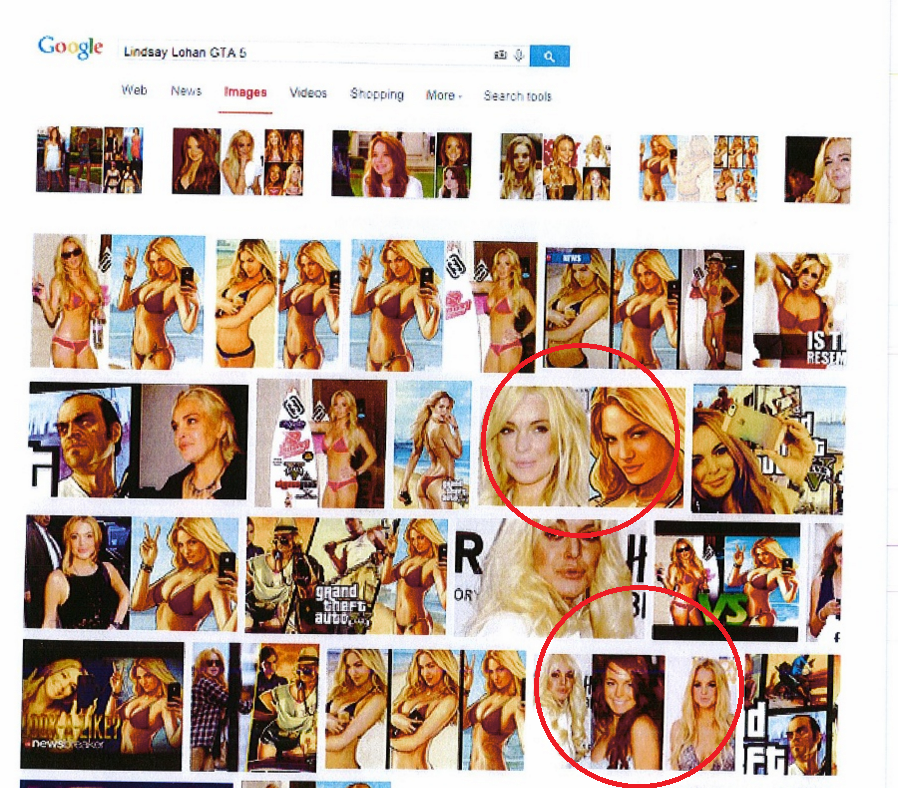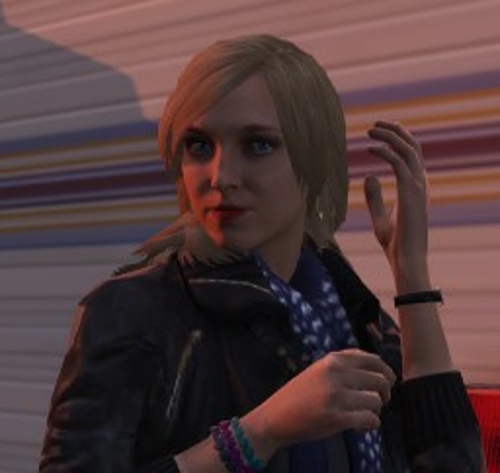Despite constantly shifting features, the distinctness of Lindsay Lohan’s looks has been called into question yet again as her battle with Rockstar Games rages on.
Lohan’s lawsuit against Rockstar isn’t really news anymore – it was 2013 (coinciding quite closely with the release of Rockstar’s Grand Theft Auto V) when the story originally broke and she accused the game devs of stealing her likeness for non-playable character Lacey Jonas (the Red Bikini girl) in the GTAV cover/adverts.

Red Bikini Girl model Shelby Welinder stepped up almost immediately in 2013 to announce her involvement with the game, but that wasn’t quite enough to clinch the deal.
Take-Two (the parent company of Rockstar Games) attempted in 2014 to have the case dismissed out of court, claiming that the lawsuit was merely a publicity stunt on Lohan’s part – and a tasteless one at that.
Unfortunately, it looks like it’s taken until now for any real progress in the stalemate to have been made… and then with a rather unexpected turn of events.
Earlier this month, New York State Supreme Court Judge Joan M. Kenney, denied Take-Two’s application for dismissal, thereby allowing Lohan’s case to proceed, but without comment on whether or not she believes there is any merit in Lohan’s claim.
This is not the first time that Lohan has sought legal action for use of her name (e.g. Pitbull, Glee) but it is certainly the first margin of success she’s actually managed to achieve.


(Gwyneth Paltrow’s guest appearance on Glee teaching Spanish by referencing Lindsay Lohan’s tabloid-worthy doings.)
Does she have a solid case?
Well, that’s an interesting one. Lohan’s team has definitely beefed up her claims, providing more point-by-point evidence than the average acid-tongued news article will admit.
You can see the full amended suit here:
(I recommend viewing it in full-screen mode or through Scribd itself.)
It’s certainly more than the original suit had for her to go on. Sure, there is plenty of hilarity in there (for instance, the insistence that the peace sign is somehow exclusively and memorably her thing), and this Google Images screencap of her name and the game’s, but the majority of which links 2013-2014 news sites reporting on her lawsuit and not actually confusing the two/drawing any real comparisons:
(For instance, I made those two images circled above myself back in 2013 while discussing the original story; see Lindsay Lohan Sues Rockstar Games Over Grand Theft Auto V)
However, it’s not just mountains out of mole hills… there’s also a few points like this that actually give her something of a leg to stand on:
“70. It is unequivocal that the Plaintiff was the intended referent in the GTA V game by using her likenesses, portraits, and voice solely to advertise the game for trade purposes and by specifically announcing the Plaintiff’s name in the media as a “Lindsay Lohan look-a-like side mission” at least two months before the release of the game purely to promote and hype the game to attract sales of the Defendants’ video game.”
Which begs the question, could she actually win?
Who knows?
Lindsay Lohan is more famous these days for insisting that she’s an A-list celebrity rather than actually doing anything that might merit such a status… but if anything, the Kardashians have taught us that’s pretty much how it’s done nowadays.
Ellie from The Last of Us was touted for being a near-exact lookalike for Ellen Page by many (and which sparked some annoyed comments from the star, who actually did work on Beyond: Two Souls that released at about the same time) but Naughty Dog didn’t build a small storyline around events in her life, ape her voice, and advertise using her name.

(To be fair, in this particular case, the final character design for Ellie was altered significantly from the much closer likeness that appeared in early promotional footage.)
The bigger question is: what happens if she does win? What could that could mean for the future where game and content creators can be sued on the basis of parody?
Some things are immediately obvious.
The community is bound to react badly – heaping scorn on Lohan’s head like no tomorrow, regardless of whether or not she wins or loses her suit. Ned Luke, the actor behind GTA V mainstay Michael de Santa already has this to say about the situation:
It’s a stretch but MAYBE there’s a resemblance. #LindsayIsNuts https://t.co/x3IQppzXSK pic.twitter.com/GfUi5gMlMf
— Ned Luke (@ned_luke) March 14, 2016
But what else?
Well, for a society steeped in pop culture (nerds aren’t nearly as immune to it as many of us think we are, especially now when nerd culture is steadily rising into societal normality), it would come as a blow to what we’d feel safe talking or poking fun about – at least commercially.
Maybe this wouldn’t be as big of an issue to triple-A studios (although one could argue that they most of all are always on the lookout for being blindsided by lawsuits), but a precedent like this one that’s already encompassed several years of dogged lawyering, would be a definite turn-off even for those that could afford it.
Smaller indie studios probably wouldn’t even be able to stand a chance. It doesn’t necessarily matter whether or not the plaintiff is likely to win or lose – legal action takes time, money, and a ridiculous amount of stress and pressure that most people just aren’t equipped to deal with.
This isn’t to say that an indie game is likely to garner the attention of someone like Lohan (although who can honestly say at this point?), or even be financially viable to sue, but it wouldn’t be hard to pressure the game-makers unduly for any and all of the sly references near and dear to gamer nerd hearts.
(For example, this stranger who may or may not be Cloud Strife just wandering around the world of indie game DLC Quest.)
While perhaps not a direct byproduct, precedents like these in a more general way encourage litigation within the community itself – and for stuff you’d think we should just learn to accept with some semblance of grace.
After all, it’s not new news that the gaming community and culture can be a scary, volatile entity – the rest of the world issues death threats and vitriol, but never with the same kind of volume and dedicated nastiness as many of our most intrepid keyboard warriors.
It’s also no secret that devs, indie and otherwise, often share in many of those volatile, passionate traits. The 2014 copyright infringement fiasco involving TotalBiscuit and indie studio FUN Creators comes to mind – a mind-boggling social media ping-pong match that had bystanders agape at the sheer sense of entitlement that a finished product must equate to good reviews, and the laughable lack of common sense attached to the studio’s accusations (“Photoshop!”).
That particular (and public) incident ended in at least one side ceding all interactions to their lawyer. One can imagine it’s hardly the first time such a thing has happened, and one can certainly assume that it’s not going to be the last.

The Lohan case is probably not going to revolutionize the gaming world. It’ll probably become (an even bigger) byword in scathing contempt against her money-grubbing ways rather than the viability of her case. But regardless of what the final verdict will be, this thing has grown bigger than most of us ever expected it to be and far more interesting than what we first thought.
It’ll be interesting to see how Take-Two will tackle it from here.










Published: Mar 28, 2016 10:33 pm